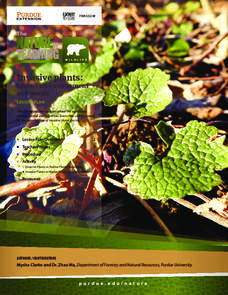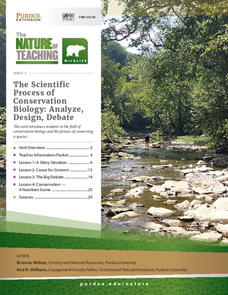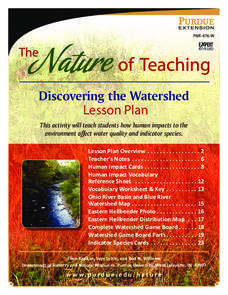Purdue University
Field Trip Snack Holder
Is light related to insulation? An informative hands-on STEM activity demonstrates how light affects temperature. First, the class investigates how light passes through different mediums and how that relates to temperature. Then,...
Purdue University
Simple Machines – Dog Gone It!
How can people use simple machines to solve real-world STEM problems? Learn about simple machines using a hands-on, project-based learning activity. First, pupils investigate and evaluate simple machines. Then, they receive a task that...
Purdue University
Healthy Body Image: A Lesson Plan for Middle School Students
This is a very valuable lesson for middle schoolers on the importance of maintaining a healthy body image through diet, exercise, and positive mentality. The resource includes four lesson plans. The first two plans outline...
Purdue University
Well-Being: Dimensions of Wellness
A unit on well-being begins with participants completing a self-assessment worksheet. After reflecting on the results, individuals set well-being goals for themselves that are SMART (Specific, Measurable, Attainable, Relevant, and...
Purdue University
Well-Being: Time Management
The final activity in a well-being series focuses on time management. Using the provided time management packet, learners first identify expectations that impact their time. Next, they complete a time management profile identifying how...
Purdue University
Well-Being: Stress Management
Five self-paced activities introduce learners to ways to recognize and cope with stress. Pupils first use a stress tracker to log stressful times and events. They also identify stressors and list the symptoms, select activities that may...
Purdue University
Exploring Whirligigs
What's that silly thing spinning in the wind? It's a whirligig! Explore wonderful windy whirligigs with a STEM-based unit that teaches the science and concepts behind these gigs. Scholars discover how gravity and air resistance...
Purdue University
Benefits of Connecting with Nature
Feel the healing effects of nature. Individuals learn about the benefits of nature using imagery. They begin by defining words to express how they feel emotionally and then practice using those words with hands-on activities. Once they...
Purdue University
Eco-llapse
A balanced ecosystem doesn't mean balanced populations. Budding scientists complete a series of activities to learn about the relationship between producers and consumers in an ecosystem. They complete the wildlife conservation...
Purdue University
Mammals and Ecosystems
Mammals have unique interactions with their ecosystems. Using a multi-part lesson, learners research local mammals using recommended websites and use their findings to create their own paper ecosystems including appropriate mammals. They...
Purdue University
Ashes to Ashes: We All Grow Up
Ecosystems are constantly changing whether people notice or not. An inquiry-based lesson examines types of ecosystem changes and how they relate to wildlife conservation. Learners classify changes as succession and disturbance using a...
Purdue University
Reptiles, Amphibians, and the Scientific Method
What do a reptile and an amphibian have in common? A three-part lesson allows scholars to investigate the similarities and differences between the two types of animals by identifying specific body parts. The lesson highlights the...
Purdue University
What a Waste of Food!
Follow the life of an apple from harvest to the consumer. A three-part lesson describes the different steps to get an apple from the farmer to your kitchen and the approximate waste that happens at each step. They discuss the process and...
Purdue University
Food Waste Solutions
Easy doesn't always mean better. In an era with pre-packaged everything, learners consider the environmental impact of the convenient trend. They critique the packaging of food and how waste impacts cost and then look for solutions.
Purdue University
Food Waste and the Environment
Out of sight out of mind can be a dangerous habit. Learners investigate the life of food waste after it leaves people's homes and its impact on the environment. They complete a series of three activities that involve building a mini...
Purdue University
Trees of the Midwest
All trees are not created equal. A set of three wildlife conservation lessons has learners examine the characteristics of individual trees. They look at the life cycle of the tree using a story and reference a field guide to identify...
Purdue University
Take-a-Hike
Learn about nature and health all in one set of lessons. Individuals use a scavenger hunt to record observations during a nature hike. They then complete activities to categorize their observations and rate the health of the habitat for...
Purdue University
Invasive Plants: Impact on Environment and People
It's the attack of the invasive species! Young scientists simulate the behavior of an invasive species with a game-like activity. They assume the roles of native plants, invasive plants, and resources and watch the invasive plant takes...
Purdue University
The Scientific Process of Conservation Biology: Analyze, Design, Debate
Scientists use data to learn about species survival—and your classes can too! A set of four lessons guides learners through a process to draw conclusions about the fluctuations in the population of the Hellbender species. They read...
Purdue University
The Great Clearcut Controversy
Urban development and habitat retention are often at odds. A three-part lesson examines the pros and cons of forest clearcutting. Learners review data and characteristics of a specific mammal to make conclusions about the effect...
Purdue University
Common Indiana Mammals
Mammals all have their own story to tell. A set of 34 cards outlines the key characteristics of different mammals. The cards include images of each mammal as well as their skulls and tracks. The back of the cards describe characteristics...
Purdue University
Coloration Exploration
Finding an animal in nature can be like a game of hide and seek. A thorough lesson explores different coloration strategies of animals. Pupils complete look-and-find puzzles and coloring sheets to differentiate between different types of...
Purdue University
Discovering the Watershed
Human impact on watersheds can make or break an ecosystem. Learners use a game to learn about the impact human choices have on water quality and the organisms that depend on it. The activity includes a game board and game cards that tell...
Purdue University
Healthy Water, Happy Home
Clear water does not mean clean water. A collaborative lesson has groups play a board game to identify sources of water pollution and develop strategies for improving water quality. Their investigations include reference to the water...

























